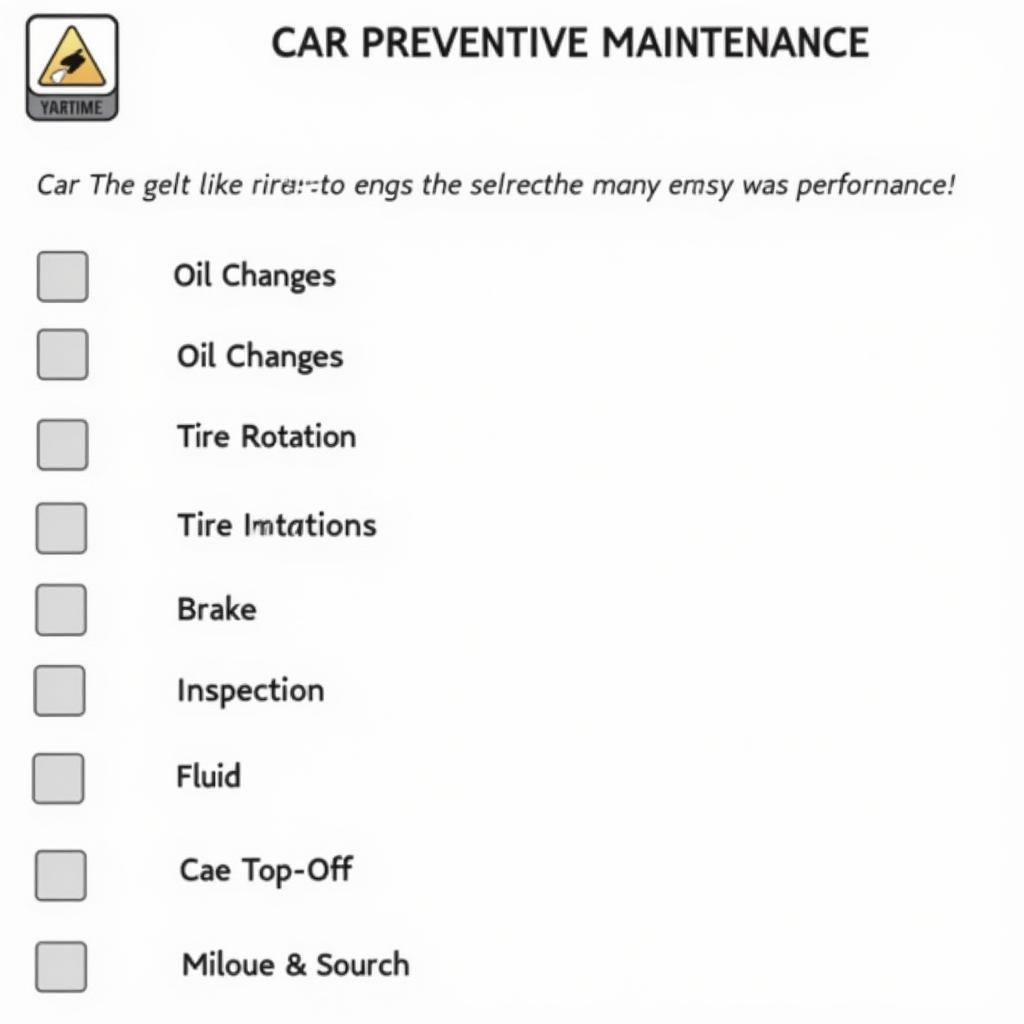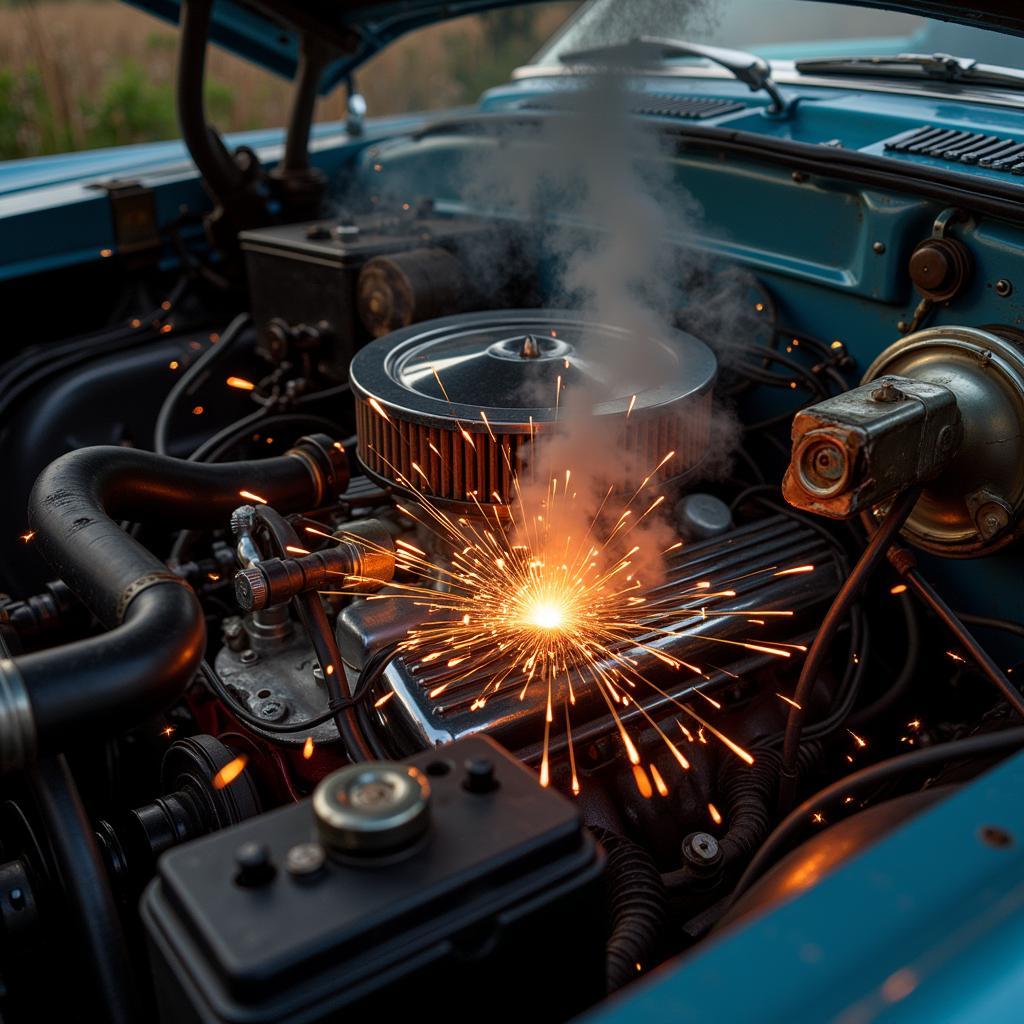A “Poor Car Maintenance Gif” often humorously depicts the consequences of neglecting your vehicle. But in reality, ignoring car maintenance isn’t a laughing matter. This guide dives deep into the serious repercussions of poor car maintenance, offering practical advice for car owners, mechanics, and technicians on how to diagnose and address potential issues before they become major headaches.
The High Cost of Ignoring Car Maintenance
Neglecting routine maintenance can lead to a cascade of problems, impacting your car’s performance, safety, and ultimately, your wallet. From reduced fuel efficiency and costly repairs to increased risk of breakdowns and accidents, the consequences can be severe. Think of it like skipping the gym – initially, you might feel fine, but over time, your health will suffer. Similarly, neglecting your car’s maintenance needs will eventually take its toll.
Spotting the Signs of Trouble: What Your Car is Trying to Tell You
Your car often communicates its needs through various signs and symptoms. Learning to recognize these early warning signals can save you from expensive repairs and dangerous situations down the road. Some common indicators of poor car maintenance include unusual noises, vibrations, leaks, warning lights on the dashboard, and changes in performance.
- Strange Noises: Squealing brakes, knocking sounds from the engine, or rumbling from the exhaust can all indicate underlying problems.
- Vibrations: A vibrating steering wheel, shaking car, or pulsating brakes could signal issues with tires, brakes, or suspension components.
- Leaks: Fluid leaks under your car, such as oil, coolant, or brake fluid, should never be ignored and warrant immediate attention.
- Warning Lights: Pay attention to any illuminated warning lights on your dashboard, such as the check engine light, oil pressure light, or ABS light.
- Performance Changes: Decreased fuel efficiency, sluggish acceleration, or difficulty starting the engine can all be signs of neglected maintenance.
Preventive Maintenance: Your Best Defense Against Costly Repairs
Just as regular exercise prevents health problems, consistent preventive maintenance is the key to keeping your car running smoothly and avoiding costly repairs. A well-maintained car is not only more reliable but also safer and retains its value better.
Essential Car Maintenance Tasks You Shouldn’t Ignore
Following a regular maintenance schedule is crucial for the longevity and performance of your vehicle. This includes tasks such as:
- Regular Oil Changes: Change your oil and oil filter according to the manufacturer’s recommendations. This is essential for lubricating the engine and preventing excessive wear and tear.
- Tire Rotations and Balancing: Rotate your tires regularly to ensure even wear and tear, and balance them to prevent vibrations and improve handling.
- Brake Inspections and Service: Regularly inspect your brakes for wear and tear and replace brake pads and rotors as needed to maintain optimal stopping power.
- Fluid Checks and Top-offs: Check and top off essential fluids like coolant, brake fluid, power steering fluid, and transmission fluid.
- Air Filter Replacement: Replace your air filter regularly to ensure clean air flow to the engine, improving fuel efficiency and performance.
“Preventive maintenance is like investing in your car’s future,” says John Davis, a seasoned automotive technician with over 20 years of experience. “A little bit of regular care can save you a lot of money and headaches in the long run.”
Addressing Common Car Problems: DIY vs. Professional Help
While some minor car maintenance tasks can be handled by DIY enthusiasts, others require the expertise of a qualified mechanic. Knowing when to seek professional help is crucial for preventing further damage and ensuring proper repairs.
When to Call in the Pros
If you encounter complex issues or lack the necessary tools and expertise, it’s always best to consult a professional mechanic. Some situations that warrant professional attention include:
- Major Engine Problems: Unusual noises, significant performance issues, or warning lights related to the engine should be addressed by a qualified mechanic.
- Transmission Problems: Slipping gears, difficulty shifting, or unusual noises from the transmission require professional diagnosis and repair.
- Electrical System Malfunctions: Electrical problems can be complex and potentially dangerous, so it’s best to leave them to the experts.
- Suspension and Steering Issues: Problems with the suspension or steering system can affect your car’s handling and safety, and should be addressed by a professional.
“Don’t underestimate the complexity of modern vehicles,” advises Sarah Miller, a certified automotive engineer. “Attempting complex repairs without proper training and equipment can lead to further damage and increased repair costs.”
Conclusion: Investing in Proper Car Maintenance Pays Off
A “poor car maintenance gif” might be amusing, but the reality of neglecting your car can be costly and dangerous. By understanding the importance of regular maintenance, recognizing the signs of trouble, and knowing when to seek professional help, you can keep your car running smoothly for years to come. Remember, investing in proper car maintenance is an investment in your safety, your wallet, and the longevity of your vehicle. Need help? Connect with AutoTipPro at +1 (641) 206-8880 or visit our office at 500 N St Mary’s St, San Antonio, TX 78205, United States. We’re here to help you keep your car in top shape!






Leave a Reply